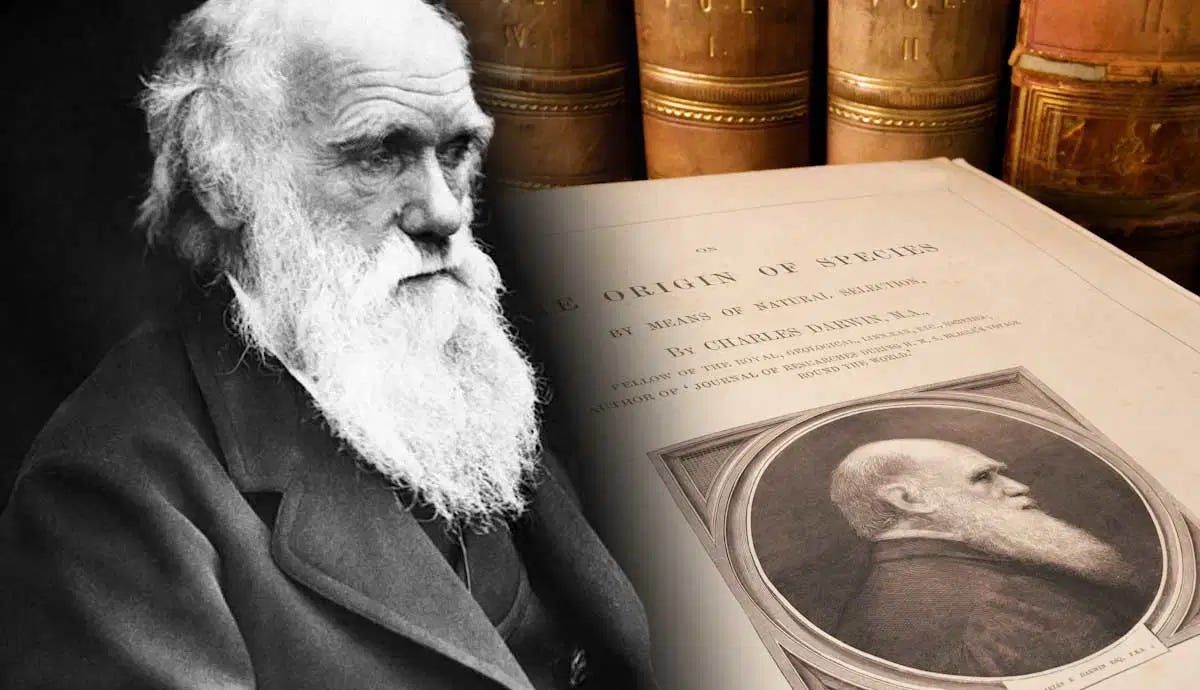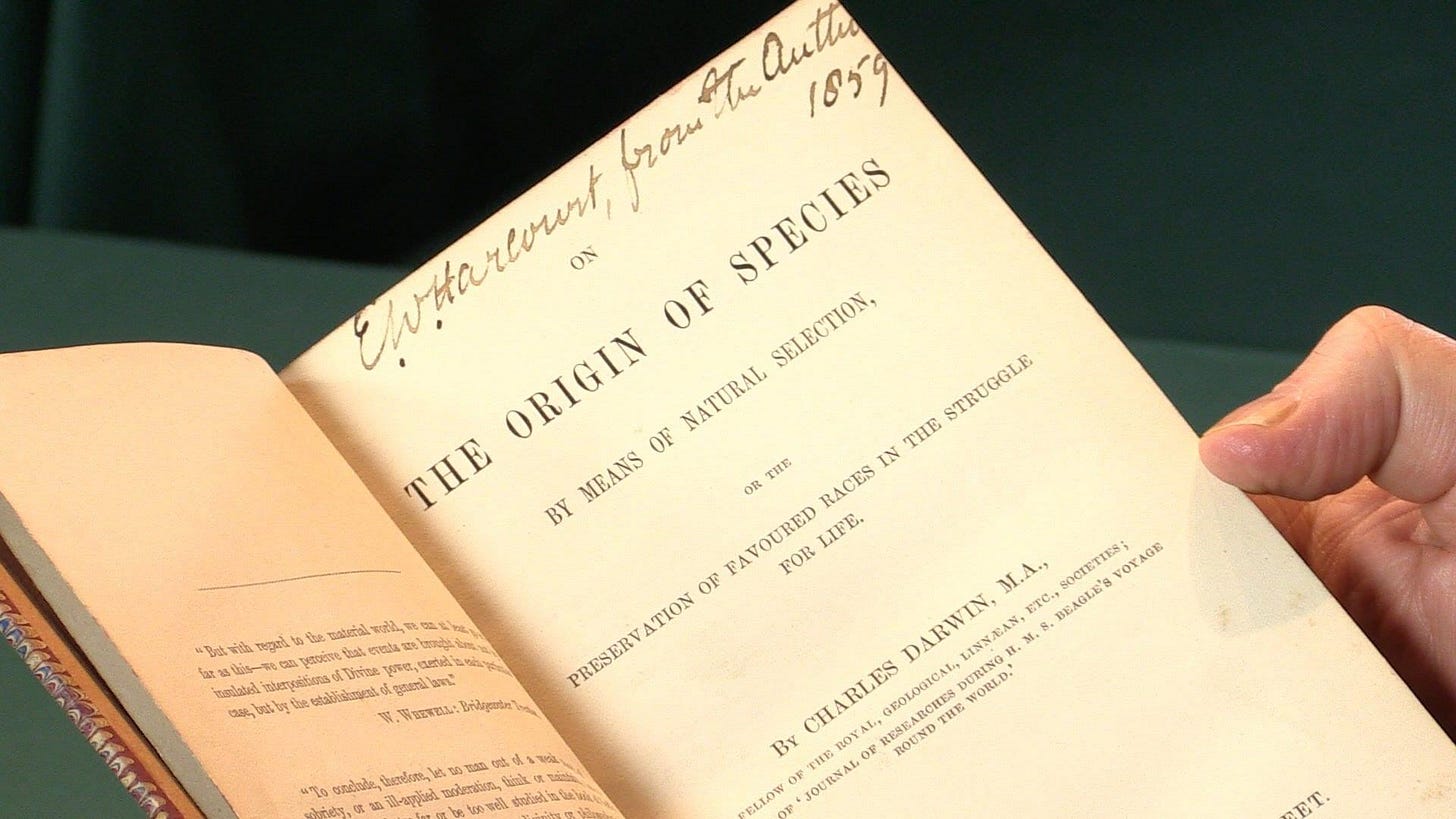On This Day 1859, Darwin Forced Us To Look Nature In The Eye
How a quiet naturalist reshaped our understanding of life and stirred a storm that still matters today
On this day in 1859, a modest green volume slipped quietly onto the shelves of a London publisher. It carried a short, almost self-effacing title, On the Origin of Species. Yet behind those words sat a revolution. What Charles Darwin offered was not a gentle nudge to established thought, but a challenge that cut to the bone of how we see the world and our place within it.
For anyone who cares about history, ideas or the long wrestling match between evidence and certainty, this moment deserves close attention. Darwin never wrote like a brawler, but the impact of his work landed like a clean strike to the jaw of Victorian confidence. Today, with the benefit of distance, we can appreciate the scale of what changed and understand why his insight still carries such power.
My own reflection, shaped by the historical episodes behind the book’s arrival, is this. Darwin’s legacy lies not only in the content of his theory, but in the courage it took to follow the evidence wherever it led. His story is a reminder that intellectual honesty often demands more grit than noise.
Roots of a Radical Thought
Long before his book reached the public, Darwin had been wrestling with an idea that would keep most people awake at night. As a young man on the Beagle, he wandered through the Galapagos convinced there was a pattern in the chaos, a rhythm to nature that did not fit the comfortable explanations of his time.
The islands confronted him with a simple yet unsettling truth. Creatures that looked similar behaved differently and were shaped by their surroundings with uncanny precision. What the sailors on the Beagle dismissed as proof of divine design, Darwin felt tugging him in a different direction. He saw subtle shifts in beaks, wings and shells. He sensed that these differences were clues, small hints at a larger story.
He returned to England armed with notebooks that bulged with observations, yet he kept his brewing theory concealed for two decades. He was not hiding in fear, though fear must have played its part. He was perfecting. Testing. Sharpening an argument that he knew would slice through long held beliefs.
To understand Darwin’s achievement, you need to picture a man isolated not by geography but by thought, refusing to rush, determined to get it right. In that discipline, there is something deeply admirable. He waited until his evidence was enough to stand on its own feet, even if he knew it would stand in a storm.
Impact of a Book That Refused to Whisper
When the book eventually appeared, polished and patient, it found readers ready for a fight. The world of the 1850s was already wobbling under the weight of scientific discoveries that chipped away at comfortable answers. Fossils, geology and the growing confidence of natural history made it harder to cling to simple certainties. Darwin’s work did not spark the fire. It simply poured fuel on something that had been smouldering for years.
What made his argument so striking was not anger or defiance, but clarity. He wrote with the calm certainty of someone who trusted his evidence far more than he trusted the tempers of his critics. The final line of the book spoke of endless forms most beautiful and most wonderful, but the pages before it carried a challenge no reader could ignore.
The reaction was immediate and fierce. Some saw liberation in his words, others heresy. Yet few remained untouched. And although his opponents often shouted the loudest, it was striking how many thinkers felt the force of Darwin’s reasoning and quietly shifted their ground.
This is something I admire most about the period. The debate around Darwin was not a battle of noise, but a test of discipline. Those who defended his ideas did so with evidence and restraint. Those who rejected them often fell back on mockery and fear. History tends to reward the former.
Clash in Oxford
One episode, seven months after publication, shows how deep the shockwaves ran. Oxford’s Museum of Natural History became the arena for one of the most famous confrontations in Victorian science. The unfinished walls and packed audience gave the moment a raw, expectant air.
Lines were soon drawn. Supporters of traditional explanations sat shoulder to shoulder with men determined to advance a new understanding of life. And although Darwin himself stayed away, either through illness or reluctance, his allies stood ready for the blows.
When the attack came, it was sharp, personal and designed to wound. Critics sneered at the idea that humans might share ancestry with animals, twisting it into a cheap jibe about grandmothers and apes. It was a laugh line, nothing more, yet it exposed the weakness of their position. Wit, once used as a shield for poor reasoning, rarely holds for long.
Darwin’s defenders answered with precision rather than spectacle. They argued for evidence over outrage, for patience over prejudice. They reminded the room that science thrives not on certainty, but on willingness to follow the strongest explanation available. Their replies carried weight because they were rooted in method rather than pride.
What mattered in Oxford was not who spoke the sharpest line. It was the clear message that the age of authority without evidence was fading. Slowly, sometimes painfully, a new standard was taking hold. And Darwin, quiet as he was, stood at its centre.
Legacy That Refuses to Fade
Darwin lived the rest of his life refining his work, answering objections with fresh analysis and adjusting his arguments as new discoveries came to light. In an era defined by certainty, he practised something far rarer. He allowed the evidence to reshape his own thinking.
When he died in 1882, carried into Westminster Abbey by friends, rivals and admirers, it was more than a personal honour. It symbolised a shift in the national mind. Britain recognised that this quiet naturalist had changed not only biology, but the expectations placed on scientific thought. Being laid to rest beside Isaac Newton was not flattery. It was recognition that both men had overturned established views through rigour rather than noise.
Today, Darwin’s name can still provoke tension in some circles, yet the core of his insight has stood firm. Evolution by natural selection remains one of the strongest frameworks science has produced. More importantly, the method behind his work, the insistence on observation, testing and revision, continues to shape how knowledge grows.
As a historian, what compels me most is not the theory itself, but the character behind it. Darwin showed that the most profound shifts in understanding often come from patience rather than bravado. He taught us that evidence demands loyalty, even when it unsettles the comfortable narratives we inherit.
On this day, we remember not only a book, but a moment when one man’s commitment to truth set a benchmark that still guides us. Darwin changed science, but he also changed the standard by which honest inquiry must be judged. That, more than any controversy or quip, is the heart of his legacy.



